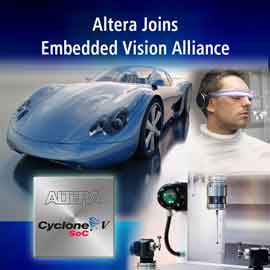FPGA Parallel Architecture and OpenCL Aid in Accelerationof Vision Processing Algorithms
Hong Kong, – July 22, 2014 – Altera Corporation announced it has joined the Embedded Vision Alliance (EVA), an industry group that brings together providers of the technology used to create practical applications of computer vision. Altera will offer the group its insightson programmable logic technologies that enable systems designers to use FPGAs, SoCs, IP, and design tools for embedded vision applications in the industrial, surveillance, automotive, military, broadcasting and consumer sectors.
 Altera FPGAs provide flexibility and performance benefits across the embedded vision processing pipeline, including image sensor interface, image signal processing, compression, transmission, and video content analytics. An FPGA’s parallel architecture aids in the acceleration of vision processing algorithms, while the Altera SDK for OpenCL design tool offers easy implementations of parallel processing applications onto FPGAs.
Altera FPGAs provide flexibility and performance benefits across the embedded vision processing pipeline, including image sensor interface, image signal processing, compression, transmission, and video content analytics. An FPGA’s parallel architecture aids in the acceleration of vision processing algorithms, while the Altera SDK for OpenCL design tool offers easy implementations of parallel processing applications onto FPGAs.
In addition,the Altera hard floating point DSP blocks facilitate native floating point support, thereby reducing development time by 6 to 12 months, and offer superior GFLOPS/W capability compared to other hard floating point solutions on the market.
“Altera is joining the alliance to propose solutions to address head-on the performance bottlenecks of CPUs,and to continue to offernew IP through the end-to-end vision processing pipeline,”said Dan McNamara, Vice President of the Industrial, Automotive, and Broadcast Business Unitat Altera. “With our industry lead in OpenCL development tools,as well as a strong, evolving ecosystem of vision processing technologies, we are joining the alliance to facilitate further innovations in the embedded vision industry.”
Altera FPGAs support various sensor interfaces, compression standards, transmission protocols, and custom video analytics, and enable systems designers to achieve higher performance in their products with hardware acceleration. Altera allows integration of multiple devices (CPU, DSP, ASSP) into one FPGA, keeping board space, power consumption and design complexity down.
“Embedded vision allows machines to see and understand the world around them, enabling them to be more responsive, safer and more capable,” said Jeff Bier, founder of the Embedded Vision Alliance. “Altera is an innovator in technologies that enable engineers to incorporate visual intelligence into their product designs. I welcome Altera to the Embedded Vision Alliance, and look forward to collaborating to advance the Alliance’s goal of empowering product creators to use embedded vision technology.”
To learn more about Altera in embedded vision applications, please visit www.altera.com.More information on the Embedded Vision Alliance can be found at http://www.Embedded-Vision.com






